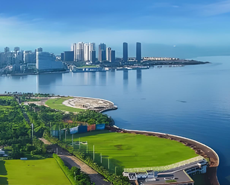
Difficult time continues in chrome alloy and ore market
----Interview with Luo Guangming
General Manager
Sichuan Shimian Dele Metallurgy Co., Ltd.
General Manager
Sichuan Shimian Dele Metallurgy Co., Ltd.
Established on July 16 2011, Sichuan Shimian Dele Metallurgy Co., Ltd. is located in Ya'an Sichuan, a city well know as "Throat of western Sichuan", "Portal of Tibet" and "Corridor of Nationalities". During the past 8 years, the company achieved great success in producing and selling high-quality ferroalloys with excellent technique support and perfect after-sales service.
Asian Metal: Mr. Luo, thanks a lot for the interview. Please give us a brief introduction about your company.
Mr. Luo: We have two furnaces of 16,500kva in total to produce HC ferrochrome in Sichuan. With advanced equipment, first-class technology and many years of experience in production and sale, we have established long-term cooperation with many steel mills and traders over the past years.

Asian Metal: Leading tender prices of HC ferrochrome further decreased by another RMB50/t (USD7.3/t) for January, and some people are of the opinion that it is "frog-boiling" strategy conducted by steel mills. What do you think?
Mr. Luo: I think the tender prices are just a normal reflection of the market, but it is noteworthy that the continuously small drop in tender prices had caused greater damage to southern smelters in China than northern. Due to the increasing power prices in dry season, a lack of access to cheap spot chrome ore and relatively inconvenient transportation in southern China, smelters became more passive in operating amid ongoing sliding tender prices.
Asian Metal: Generally speaking, the ferrochrome market stayed weak this year with prices continuously sliding, and the current spot prices of HC and LC ferrochrome decreased to the lowest level. What do you think are the major reasons?
Mr. Luo: Apart from the policy factors, firstly, the stainless steel market stayed soft which resulted into poor demand for ferrochrome. Besides, the port inventory of chrome ore was enormous with low prices in Chinese and overseas markets. Without the support from upstream raw material and downstream demand, it was impossible for the ferrochrome prices to move up. What's more, the production capacity expanded with new smelters put into operation, especially in Inner Mongolia. However, I still harbor the idea that the ferrochrome market is not genuinely oversupplied, but the general weak economic condition makes the market prices decline continuously as insiders are not in a hurry to make purchases as the material is available.

Asian Metal: When do you think is the turning point for the market in 2019?
Mr. Luo: I don't think there will be a turning point for the prices to increase sharply in the first several coming months in 2019, but it will also be impossible for the prices to further decline drastically. I believe the market prices would go up in March or April 2019 with improved downstream demand as stainless steel market will enter the high season. Moreover, the current smelters are confronted with great loss, and if the prices continue to drop, even producers in Inner Mongolia will also suffer loss.

Asian Metal: Chrome ore traders in China are having a hard time this year. Do you have any suggestions for them in 2019?
Mr. Luo: Most chrome ore traders are based at Tianjin port. As a ferrochrome producer in Sichuan, we hardly have much connection, but there is something we want to stress here. Chrome ore traders function as the impounding reservoir in the chrome market, but there are hardly any dealers in Chongqing port which is close to Sichuan. Smelters in Sichuan mainly import seaborne cargos in the production, which means more inventory pressure and low ability to avoid risks. Besides, the furnaces used in southern China are always low-power and we have to mix various chrome ore concentrate and lump in the production of ferrochrome, which increases the difficulty in purchase, so I sincerely appeal to chrome ore dealers in China to spare some attention to Chongqing port. As one of the major production areas in China, Sichuan is in great need of chrome ore and opens to new mineral species of high cost performance. The high flow period in Sichuan will come in March, which makes demand for chrome ore increase, but Chongqing port is always empty at this time. Traders can consider shipping their inventories here and it is by no doubt that the sale would be much better than that in Tianjin port. If smelters in Sichuan could get some convenience in logistics cycle and cost of capital, it would be good for the healthy development of the whole industry.

Asian Metal: As a producer in Sichuan, what do you think are the advantages and disadvantages?
Mr. Luo: Power price is the biggest advantage in Sichuan as we have a total of about 7 months of wet season and normal season. Besides, major producers in this area have good reputation with deep pocket, excellent products and service in the industry. However, the disadvantages are also obvious. Sichuan is a place with inconvenient transportation and lacks of access to cheap spot chrome ore.
















